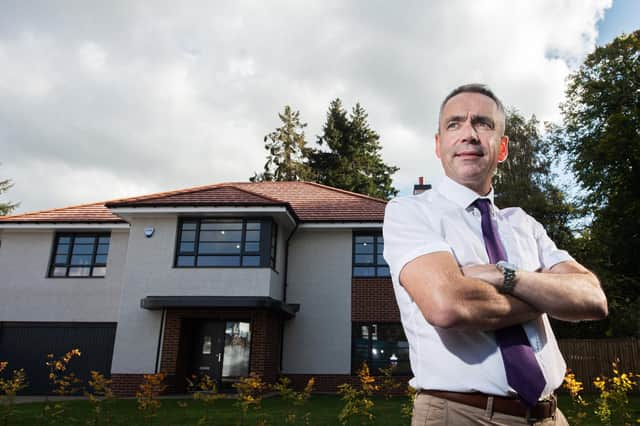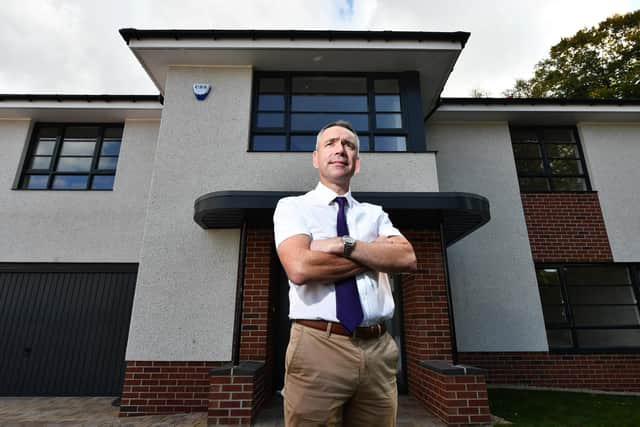The Big Interview: Mactaggart & Mickel CEO Ed Monaghan


Ed Monaghan is chief executive of Glasgow-based housebuilder Mactaggart & Mickel, which he joined as an apprentice more than 40 years ago. The fourth-generation family firm, which has been creating homes since 1925, has seven divisions: homes, timber systems, investments, strategic land, commercial property, lettings and contracts.
Monaghan was one of the winners at the Institute of Directors’ (IoD) Scottish awards last month, and judges said: “Ed is at the helm of a substantial and long-established family business. While he is not a family member, he is pivotal to the continuation of the family’s values, which is usually a very difficult task.”


Advertisement
Hide AdAdvertisement
Hide AdWe have not been alone in having to face significant challenges posed by the coronavirus outbreak, to which we have responded positively. Since the housing market re-opened in July, we have seen an increased demand for our homes and our sales team has been busy, which is very encouraging.
We’ve noticed that emerging trends around how people live, work and travel have accelerated during lockdown. Some are likely to stick, and we have seen interest grow in properties in rural and suburban locations. Increasingly, people are looking for more space, as more of us work from home, alongside a garden.
You were named Director of the Year in the family business category at the IoD’s Scottish awards. It was given for the group’s performance in the three years to April, with milestones including investing in England. Can you give more details on winning the accolade and the firm’s progress in that time?Winning the award was a timely reminder of the progress we have made as a group over recent years.
Expanding housebuilding activity into England to complement our strategic land business that has operated down south for more than ten years was part of a strategy to rebalance our portfolio. In 2018, we were delighted to break ground on our first site in Oxfordshire.
In addition, our private rental sector division invested in new units in London. This investment alongside our Scottish rental properties brings our overall portfolio to £70 million. I’ve been honoured to lead a company steeped in history through this period and I was humbled to win the [IoD] award, but it really should be dedicated to all my Mactaggart & Mickel colleagues.
You joined the company as an apprentice more than 40 years ago – how did your career there progress?
I started off as an apprentice painter and decorator at the age of 16. There was no masterplan, other than hard work and, as always in life, a huge amount of luck, being in the right place at the right time. I had an aptitude for the job and a love for what we do and that was identified and supported by the people above me, and when an opportunity arose I was happy to grab it with both hands.
Three weeks into my apprenticeship, I was sent to college, which I really enjoyed, and as well as obtaining my City & Guilds, I went on to get a HNC in building management, which projected me forward. I worked my way up through the buying department then as a surveyor, general manager, director and MD before becoming CEO.
Advertisement
Hide AdAdvertisement
Hide AdOne of the good things about Mactaggart & Mickel’s culture is that if you’ve an individual prepared to work hard to contribute to the growth of the company then we will always try to enhance that and let our people grow, develop and achieve their full potential. Being a family business also helps, as structurally we are more able to adapt to opportunities while promoting and encouraging colleagues to move up through the company.
Mactaggart & Mickel is a family firm, and as you are not a member of the family, how do you drive forward its values?
Mactaggart & Mickel is rare in our sector, in that we have been family-owned since the company’s inception in Scotland in 1925. We are one of a small number of businesses that retain this status into the fourth generation. I’m proud to be part of that story.
I work closely with members of the family – Andrew and Ross Mickel are active board members. They have played a vital role in supporting the growth and evolution of the company in a challenging economic environment over the last decade.
My stewardship of the company alongside the family in recent years has happened against a backdrop of significant change, for the housebuilding industry and the Mactaggart & Mickel group of companies. The family members have always been at the forefront of these changes, with me and members of the executive team supporting them.
We have continuous dialogue with the extended active family shareholders, including shareholder forums and group board updates. Having worked here for more than 40 years, I can say that our family-owned ethos extends across the business, with many members of staff working with us for decades.
Also, what advantages and disadvantages do you see with being a family business?
Stability at the top of the company is the main strength of our history as a family business because it has provided a continuity that has proved vital to steer the company through ups and downs.
Advertisement
Hide AdAdvertisement
Hide AdOur vision for the future of the company is communicated widely and shapes board decisions. Mactaggart & Mickel stands for quality and trust. Our history is something to be proud of and that’s why we launched a new brand in 2019 to emphasise the group’s family heritage and inspire confidence in its future.
Mactaggart & Mickel helped deliver the Commonwealth Games Athletes’ Village – can you explain more about this?
They say timing is everything in sport, and probably in business. That was certainly the case with the project because it came around at a good time for us, starting in 2012 as we emerged from the last recession.
As part of the City Legacy consortium – which comprised Mactaggart & Mickel, CCG, Cruden and WH Malcolm – we were able to allocate a lot of resource to the project and I believe the whole business was able to take a lot of pride from contributing to an international sporting spectacle.
I’m proud that it’s had a lasting legacy by helping in a small way to rejuvenate the Dalmarnock area where, as well as high-quality new homes, investment in recent years has yielded jobs and community facilities. From a financial perspective, the project was a success and it was gratifying to win a series of awards for our work, most notably when the City Legacy consortium won the Queen’s Award for Enterprise in the Sustainable Development category, which led to us being invited to a reception at Buckingham Palace, hosted by the Queen.
How is Brexit going to affect the business and what measures are you planning to take?
Pre-Covid, Brexit was the number one risk on most business radars. It was unimaginable that something would come along and knock Brexit off the top of the risk register, but that is what Covid-19 has done. That said, we had made provisions for Brexit, deal or no deal, and we will implement our plans as and when the final position unfolds.
What is your outlook for the building sector in Scotland as a whole?
Advertisement
Hide AdAdvertisement
Hide AdThe sector has dealt with the first wave of Covid-19 challenges pretty well and the way companies have bounced back more positively from lockdown than we probably could have imagined is encouraging. With furlough coming to an end, the threat of rising unemployment is looming.
We may well need to dust down what we learnt during the last downturn, namely working closely with all of our stakeholders, along with Homes for Scotland, the CBI and other industry bodies to continue to lobby government on the importance of what we do, and the wider benefits a prosperous construction sector can have on the wider economy.
What are Mactaggart & Mickel’s chief business goals and aims over the coming year, and further ahead?
In the immediate term, we need to continue to innovate and adapt, and provide the very best quality and service we can for our customers during these difficult times. Focusing on what we can do and not what we can’t do will allow us to forge the next chapter of the company’s history as we head towards our 100th anniversary in 2025.
A message from the Editor:
Thank you for reading this story on our website. While I have your attention, I also have an important request to make of you.
The dramatic events of 2020 are having a major impact on many of our advertisers - and consequently the revenue we receive. We are now more reliant than ever on you taking out a digital subscription to support our journalism.
Subscribe to scotsman.com and enjoy unlimited access to Scottish news and information online and on our app. Visit https://www.scotsman.com/subscriptions now to sign up. By supporting us, we are able to support you in providing trusted, fact-checked content for this website.
Joy Yates
Editorial Director
Comments
Want to join the conversation? Please or to comment on this article.